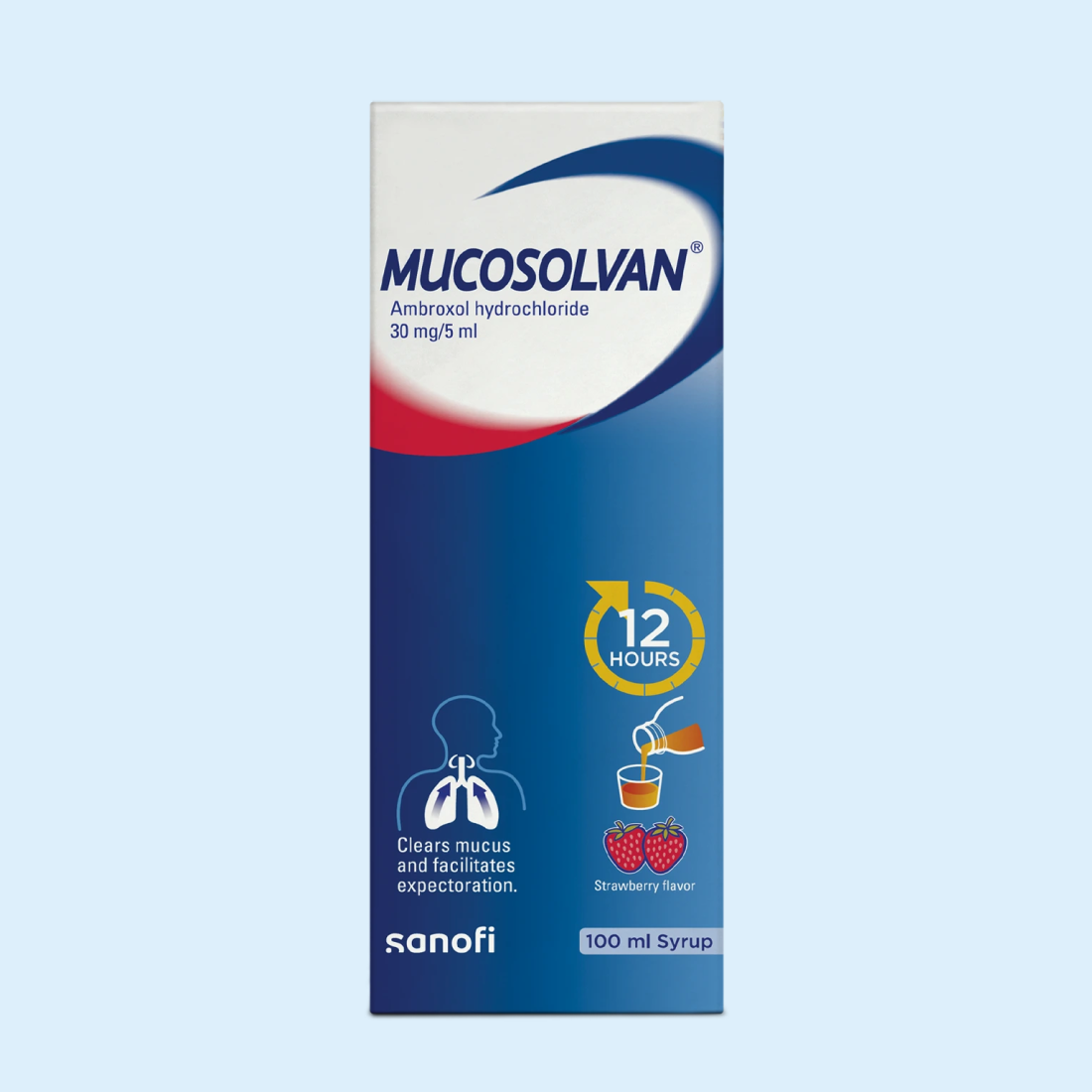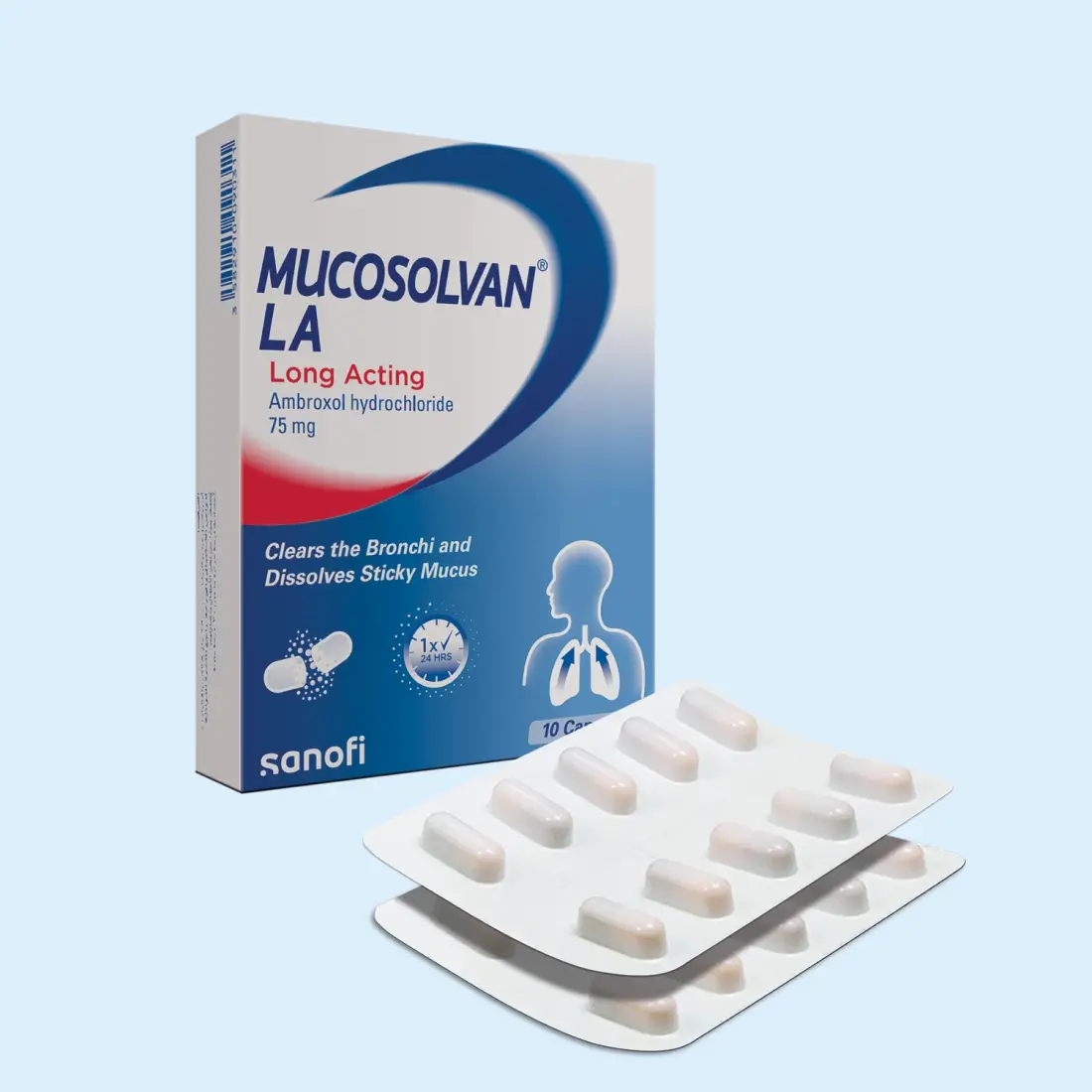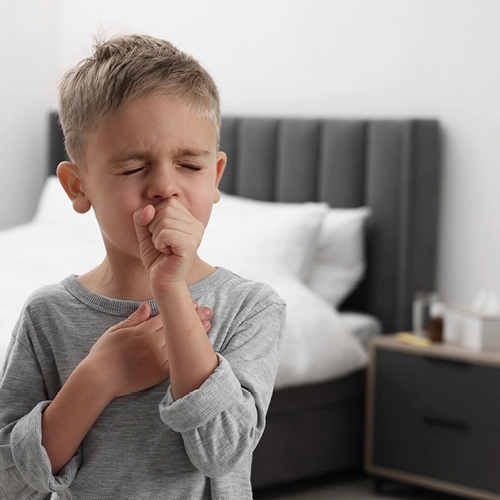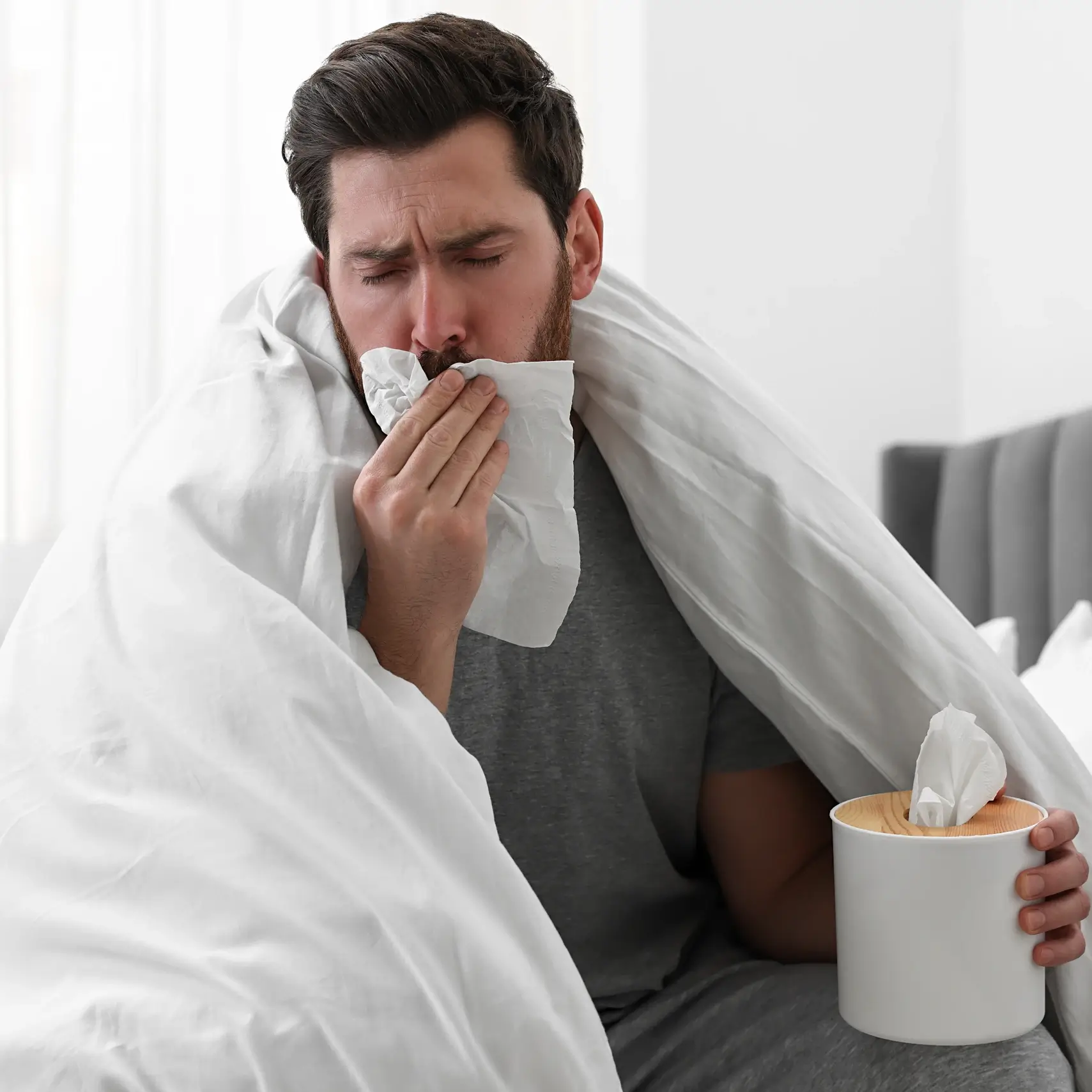
How many types of cough are there?
Some common types of cough are:
- dry, unproductive cough
- wet, productive cough
- night-time cough
- acute cough
- chronic cough
Dry versus wet cough
They say, “Three things cannot be hidden: coughing, poverty, and love.” This old Yiddish proverb, some scientists say, refers to our coughing reflex. When our body wants to cough, there’s simply nothing you can do to stop it 2.
Typically, we use the term “dry cough” to describe a cough without mucus or phlegm and “wet” or “productive cough” to describe a cough with phlegm 3. In a cold or the flu, both types of cough are caused by the same thing: a viral infection. When there’s inflammation in the airways, the cough reflex becomes super-sensitive, and there may also be an increase in mucus production 1, 3.
With a cold or the flu, you can have both a dry cough and a productive one at different points throughout the course of the viral infection 1. Usually, the cough starts as “dry,” or unproductive, only to become productive later on, when the inflammation spreads to the lower airways, causing your lungs to produce mucus 1.
Types of cough sounds in adults and kids
A cough can also be grouped into different categories based on its sound.
For example, types of cough sounds in adults include 4:
- brassy
- rattling
- loose
- productive
- wheezy
- barking
In children, coughs can also be grouped based on the type of coughing sound. Types of coughs in kids include 5:
- dry cough like in the case of colds or the flu
- dry/staccato cough like in the case of pneumonia
- barking/brassy cough, like in the case of croup
- barking/honking cough like in the case of habit cough
- spasmodic/whooping, like in the case of whooping cough, or pertussis infection
We advise visiting a doctor to diagnose the type of cough, especially in children, just to be sure to rule out any more serious underlying conditions.
Acute versus chronic cough
Finally, coughs can be categorized by duration as well.
In terms of how long it lasts, a cough can be 6:
- Acute: This is a short-term cough, lasting for 3 weeks or less
- Subacute: These coughs last between 3 and 8 weeks
- Chronic: These are the most long-term. A cough is chronic it lasts longer than 8 weeks.
What's the treatment for cough?
If you have a cough from a respiratory infection, like a cold or the flu, there isn’t yet a medicine that can cure your cough. However, there are many things you can do to ease your symptoms, and a few types of cough syrup that you can try.
For example, you can try cough suppressants to dull the cough reflex, making you less sensitive to coughs 6. When coughs become productive, expectorants can help you clear the mucus out 6.
These cough remedies are usually available without prescription.
How to treat a dry cough
Here are some tips for relieving a dry cough 7, 8:
- Stay well hydrated by drinking plenty of water. This will keep your throat moist and soothe that dry, tickly irritation.
- Drink a tasty warm drink, such as tea with honey and lemon, to soothe your throat.
- Have a lozenge, popsicle, or sugary candy that you can suck on. This will help lubricate your throat and calm irritation.
- Take a teaspoon of honey 8.
- Try sitting upright and avoid lying on your back 8, as this can worsen your cough.
- Non-prescription remedies like dextromethorphan (Bisolvon Antitusivo) can reduce your cough by inhibiting the cough reflex. It can also dull the super-sensitivity that comes with an infection 6, 9.
- Some non-prescription herbal remedies like plantain, thyme, and marshmallow (Bisolherbal) have been shown to relieve coughs as well 9, 10.
How to treat a wet cough
Here are some tips for relieving a wet, productive cough:
- Try lying on your side or sitting upright. These positions will help you clear out the phlegm from your lungs 7.
- Inhale steam, either through inhalation or by taking a hot shower 7.
- Try breathing through your nose as breathing through the mouth can worsen the cough 7.
- Non-prescription cough remedies, such as bromhexine (Bisolvon) and ambroxol (Mucosolvan), can thin the mucus in your airways and help clear it out 9. Ambroxol (Mucosolvan) also has anti-inflammatory and antioxidant properties 9.
How to relieve a night-time cough
Here are some tips for relieving night-time cough:
- Try sleeping on your side and not on your back during the night 8, 12. When you’re sleeping on your back, your throat is narrower, which can irritate your cough receptors and make you more sensitive to coughs 12.
- You can also try sleeping in a slightly upright position 8. Use some pillows to prop yourself up during sleep, as this may aid your breathing and clear out the phlegm from your lungs 8.
- Ambroxol (Mucosolvan) has been shown to reduce night-time coughs 13. It is also fast-acting.
When is a cough serious?
A cough can be caused by many things, ranging from a common cold to bronchitis, asthma, or allergies 6. Therefore, it’s important not to self-diagnose, and always consult with a doctor if you’re worried about your cough.
You should also see your doctor if you have any of the following symptoms 14:
- your cough has persisted for more than 3 weeks
- your cough is severe or suddenly gets worse
- you cough and feel generally very unwell
- you have chest pain or find it hard to breathe in addition to coughing
- you’re coughing and have lost weight unintentionally
- you’re coughing and have swollen glands (your neck feels swollen or painful)
- you have a condition that weakens your immune system, or are undergoing chemotherapy
You should see a doctor immediately if you’re coughing up blood 14.
FAQs
Cough in pneumonia can be dry or productive and produce phlegm 16.

1. Eccles R. Understanding the symptoms of the common cold and influenza. Lancet Infect Dis. 2005 Nov;5(11):718-25. doi: 10.1016/S1473-3099(05)70270-X. PMID: 16253889; PMCID: PMC7185637.
2. Song WJ, Morice AH. Cough Hypersensitivity Syndrome: A Few More Steps Forward. Allergy Asthma Immunol Res. 2017 Sep;9(5):394-402. doi: 10.4168/aair.2017.9.5.394. PMID: 28677352; PMCID: PMC5500693.
3. Morice, Alyn H., A new way to examine acute cough in the pharmacy, The Pharmaceutical Journal, accessed 20 December 2022, available at https://pharmaceutical-journal.com/article/research/a-new-way-to-look-at-acute-cough-in-the-pharmacy
4. Smith JA, Ashurst HL, Jack S, Woodcock AA, Earis JE. The description of cough sounds by healthcare professionals. Cough. 2006 Jan 25;2:1. doi: 10.1186/1745-9974-2-1. PMID: 16436200; PMCID: PMC1413549.
5. Alsubaie H, Al-Shamrani A, Alharbi AS, Alhaider S. Clinical practice guidelines: Approach to cough in children: The official statement endorsed by the Saudi Pediatric Pulmonology Association (SPPA). Int J Pediatr Adolesc Med. 2015 Mar;2(1):38-43. doi: 10.1016/j.ijpam.2015.03.001. Epub 2015 Mar 20. PMID: 30805435; PMCID: PMC6372369.
6. Sharma S, Hashmi MF, Alhajjaj MS. Cough. [Updated 2022 Aug 18]. In: StatPearls [Internet]. Treasure Island (FL): StatPearls Publishing; 2022 Jan-. Available from: https://www.ncbi.nlm.nih.gov/books/NBK493221/
7. NHS Inform, Cough - Long-term effects of COVID-19, accessed December 20, 2022, available at https://www.nhsinform.scot/long-term-effects-of-covid-19-long-covid/signs-and-symptoms/long-covid-cough
8. BMJ Best Practice, Coronavirus disease 2019 (COVID-19) Management recommendations, accessed December 20, 2022, available at https://bestpractice.bmj.com/topics/en-gb/3000201/management-recommendations
9. Kardos P, Dinh QT, Fuchs KH, Gillissen A, Klimek L, Koehler M, Sitter H, Worth H. German Respiratory Society guidelines for diagnosis and treatment of adults suffering from acute, subacute and chronic cough. Respir Med. 2020 Aug-Sep;170:105939. doi: 10.1016/j.rmed.2020.105939. Epub 2020 Apr 25. PMID: 32843157.
10. Murgia V, Manti S, Licari A, De Filippo M, Ciprandi G, Marseglia GL. Upper Respiratory Tract Infection-Associated Acute Cough and the Urge to Cough: New Insights for Clinical Practice. Pediatr Allergy Immunol Pulmonol. 2020 Mar;33(1):3-11. doi: 10.1089/ped.2019.1135. PMID: 33406022; PMCID: PMC7875114.
11. Wise PM, Breslin PA, Dalton P. Sweet taste and menthol increase cough reflex thresholds. Pulm Pharmacol Ther. 2012 Jun;25(3):236-41. doi: 10.1016/j.pupt.2012.03.005. Epub 2012 Mar 23. PMID: 22465565; PMCID: PMC4638412.
12. NHS Sussex Community, Useful tips if you’re recovering from COVID-19, accessed December 20, 2022, available at https://www.sussexcommunity.nhs.uk/patients-and-visitors/resources/patient-resources/long-covid-information-and-resources
13. Kardos P, Beeh KM, Sent U, Mueck T, Gräter H, Michel MC. Characterization of differential patient profiles and therapeutic responses of pharmacy customers for four ambroxol formulations. BMC Pharmacol Toxicol. 2018 Jul 4;19(1):40. doi: 10.1186/s40360-018-0229-y. PMID: 29973292; PMCID: PMC6030777.
14. NHS, Cough, accessed December 20, 2022, available at https://www.nhs.uk/conditions/cough/
15. Song WJ, Hui CKM, Hull JH, Birring SS, McGarvey L, Mazzone SB, Chung KF. Confronting COVID-19-associated cough and the post-COVID syndrome: role of viral neurotropism, neuroinflammation, and neuroimmune responses. Lancet Respir Med. 2021 May;9(5):533-544. doi: 10.1016/S2213-2600(21)00125-9. Epub 2021 Apr 12. PMID: 33857435; PMCID: PMC8041436.
16. NHS Inform, Pneumonia, accessed 20 December 2022, available at https://www.nhsinform.scot/illnesses-and-conditions/lungs-and-airways/pneumonia
a. Mucosolvan Syrup leaflet last revised in July 2022.
b. Mucosolvan 75mg capsules leaflet last revised in July 2022.



-2.webp)


%20(1)%20(1).webp)
%20(1).webp)


%20(1).webp)